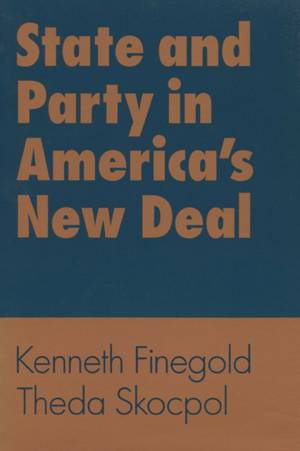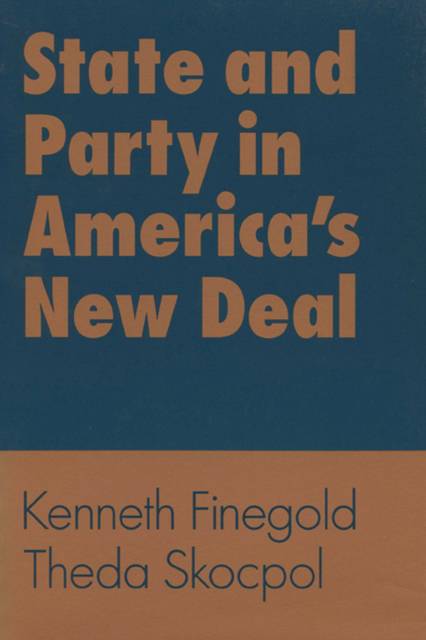
Bedankt voor het vertrouwen het afgelopen jaar! Om jou te bedanken bieden we GRATIS verzending (in België) aan op alles gedurende de hele maand januari.
- Afhalen na 1 uur in een winkel met voorraad
- In januari gratis thuislevering in België
- Ruim aanbod met 7 miljoen producten
Bedankt voor het vertrouwen het afgelopen jaar! Om jou te bedanken bieden we GRATIS verzending (in België) aan op alles gedurende de hele maand januari.
- Afhalen na 1 uur in een winkel met voorraad
- In januari gratis thuislevering in België
- Ruim aanbod met 7 miljoen producten
Zoeken
Omschrijving
Providing a needed historical perspective on current debates about industrial and agricultural policy, Kenneth Finegold and Theda Skocpol compare the origins, implementation, and consequences of two similar programs from Franklin Roosevelt's New Deal, each of which committed the federal government to extensive intervention in sectors of the U.S. economy. The Agricultural Adjustment Administration (AAA) and its industrial counterpart, the National Recovery Administration (NRA), had very different fates. The politically and economically successful AAA set trends in American farm policy that continue to the present. The NRA was rejected as an abysmal failure. Why such drastically different outcomes?
A historical and institutional approach, Finegold and Skocpol contend, can explain the similarities and differences of the NRA and AAA better than competing approaches of pluralism, elite theory, Marxism, or rational choice. They show that the AAA aided large commercial farmers and increased their power over tenants, sharecroppers, and farm workers. The NRA, however, worked against the interests of its original business supporters and encouraged union organization among their workers. Finegold and Skocpol explain the contrasts in these programs by showing differences in the organization of governmental intervention in agriculture and in industry before the New Deal, and by tracking the differing ways capitalists, farmers, and workers participated in the New Deal political coalition.
Both Finegold and Skocpol have been prominent in bringing renewed attention to national political institutions. Their crisp analysis of state and party dynamics contributes to theories of politics in advanced industrial societies and will appeal to political scientists, policy makers, sociologists, historians, and economists--in short, all those who must understand how past programs influence present U.S. policies.
A historical and institutional approach, Finegold and Skocpol contend, can explain the similarities and differences of the NRA and AAA better than competing approaches of pluralism, elite theory, Marxism, or rational choice. They show that the AAA aided large commercial farmers and increased their power over tenants, sharecroppers, and farm workers. The NRA, however, worked against the interests of its original business supporters and encouraged union organization among their workers. Finegold and Skocpol explain the contrasts in these programs by showing differences in the organization of governmental intervention in agriculture and in industry before the New Deal, and by tracking the differing ways capitalists, farmers, and workers participated in the New Deal political coalition.
Both Finegold and Skocpol have been prominent in bringing renewed attention to national political institutions. Their crisp analysis of state and party dynamics contributes to theories of politics in advanced industrial societies and will appeal to political scientists, policy makers, sociologists, historians, and economists--in short, all those who must understand how past programs influence present U.S. policies.
Specificaties
Betrokkenen
- Auteur(s):
- Uitgeverij:
Inhoud
- Aantal bladzijden:
- 368
- Taal:
- Engels
Eigenschappen
- Productcode (EAN):
- 9780299147648
- Verschijningsdatum:
- 15/02/1993
- Uitvoering:
- Paperback
- Formaat:
- Trade paperback (VS)
- Afmetingen:
- 153 mm x 228 mm
- Gewicht:
- 512 g

Alleen bij Standaard Boekhandel
+ 54 punten op je klantenkaart van Standaard Boekhandel
Beoordelingen
We publiceren alleen reviews die voldoen aan de voorwaarden voor reviews. Bekijk onze voorwaarden voor reviews.









